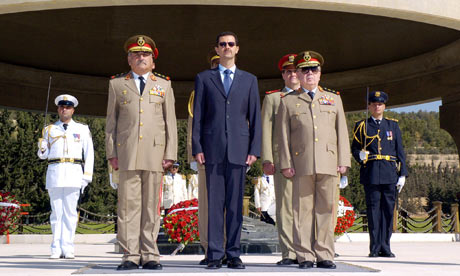 |
| AP - via The Guardian |
This is not an in-depth, analytical piece of real academic value. Just a wild thought I wanted to think out loud, caused by fasting more than a dozen hours in the heat of Ramadan.
I had several long conversations yesterday, the first day of Ramadan. None of them were about fasting, almost all were about Syria. Among the topics that stood out: what does the FSA really want to achieve in Damascus and onwards, and what can Assad's regime do now. The recent bombings that ended the lives of three top-ranking Syrian officials, including Bashar's brother in law, and reportedly significantly hurt his brother, suddenly pushed everyone towards the realisation that Assad and his regime may not be as strong as once thought, and that an Operation Valkyrie-like ending for Bashar and possibly his entire regime in consequence might even be possible any moment now. That, of course, prompted the question: what happens now, what happens next?
There are a few scenarios being floated already. Quickly: one assumes Assad uses the remainder of his firepower and Shabbiha to attempt to crush the FSA "at any cost," another even imagines the regime using chemical weapons to literally obliterate the resistance and - by extension - scores of citizens as well. Others assume the FSA would somehow win, whether through a continued series of assassinations that would wipe out regime figures, and/or high-ranking defections, possibly even an eventual coup. There is another scenario, very outlandish, but one that I wanted to throw out into the ether for the sake of pseudo-intellectual banter.
This scenario assumes that the best the FSA hopes to do in Damascus is apply pressure to both weaken the regime but to also pull away some army troops stationed outside of Damascus towards the capital, allowing the FSA to more fully free a few regions and establish safe havens outside of the capital, especially along the border with Turkey, an idea which has been called for before (John Mccain suggested it, even floating going in with air strikes à la Libya.) These zones would then come under FSA or SNC administration. If that happens, international forces could somehow end up being deployed by the border, or at least exist in a large humanitarian and reconstructive capacities, making it harder for the regime to attack such regions again without incurring the reprisal of real military power this time. A green line between regime-controlled and opposition-controlled regions is set.
If that - in turn - happens, one of two possibilities then could take place. This first would be that one side eventually pushes towards the other, if the situation allows for it. The second would be that a standoff ensues, with two governments ruling different parts of Syria, a modified North-South Korea situation that is likely to last a much shorter amount of time than its Korean counterpart, but still remain for some considerable time, until a permanent settlement is reached or imposes itself.
The potential consequences of such a move are manifold, and divergent. But potentially one of the largest of such effects would be on Arab public opinion, for which the idea of a divided Syria has been one of the most common conspiracy theories that were being toute for years and years. And, in this outlandish scenario (just reminding you that this is nothing more than a mental exercise), if the FSA/SNC regime does not win sufficient public endorsement as the NTC eventually did in Libya and much of the Arab world, the regime might find itself under less Arab pressure to fall, especially if it sacrifices Bashar. Instead of Libya, a variation of Yemen eventually perhaps, wherein the opposition and the regime work out a deal forward. Of course, that would not take place without the passage of a substantial amount of time with each side firmly behind the Green Line.
But anyway, this is - at best - brainstorming.
No comments:
Post a Comment